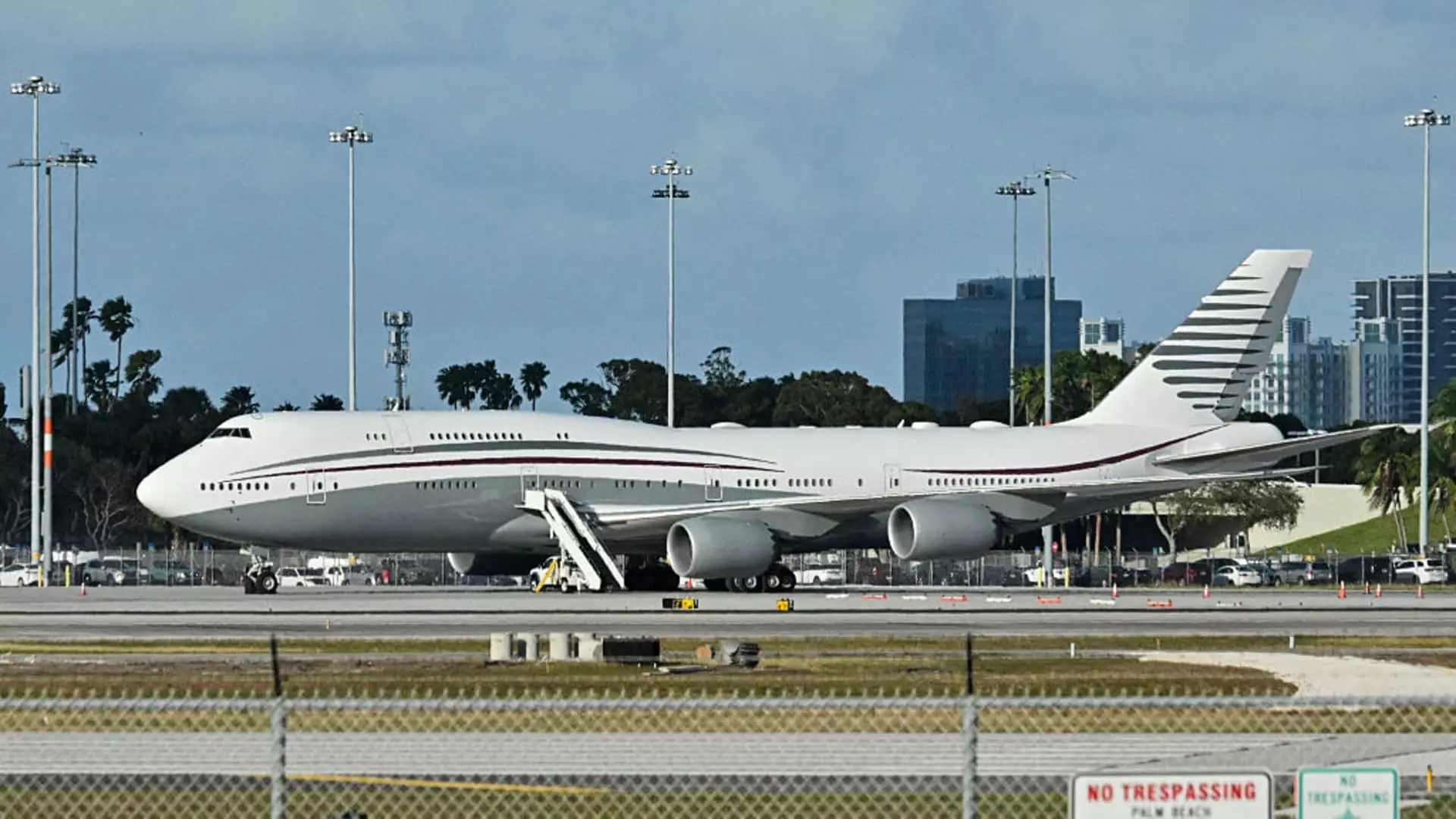In an era defined by partisan squabbles and escalating public scrutiny, the Trump administration’s acceptance of a lavish Boeing 747 from Qatar is a spectacle that delivers both shock and bewilderment. As Defense Secretary Pete Hegseth proudly accepted this so-called “gift,” the implications reverberated through the political landscape, prompting a moral reckoning on the nature of foreign aid and presidential ethics. With the backdrop of a deeply divided political arena, the act raised eyebrows, sparking accusations of bribery from Democrats and raising legitimate state security concerns from unexpected corners within the Republican Party.
Given the plane’s astronomical estimated value of $400 million, it’s hardly just a mere gesture of goodwill. Instead, it resembles a transactional exchange cloaked in political ambiguity, wherein the lines between diplomacy and potential corruption blur alarmingly. Critics, including Senate Minority Leader Chuck Schumer, have been vocal in their condemnation, framing this transaction as a stain on the dignity of the presidency. It’s hard to ignore such vigorous opposition; this isn’t merely a luxury item, but a symbol of what might be a troubling precedent for future interactions between U.S. leaders and foreign governments.
A Presidential Playground or a National Security Risk?
There’s an undeniable undercurrent of skepticism surrounding the strategic suitability of integrating a 13-year-old Qatar jet into the fleet of Air Force One. While Trump optimistically deemed the acquisition a “great thing,” experts have not been shy in their assessments, warning that converting this aircraft to meet the stringent requirements for presidential travel could lead to a financial boondoggle for taxpayers, ballooning expenses to over $1 billion. Not only is it a financial gamble, but one must also question the integrity of having a potentially compromised foreign jet as the face of American diplomacy.
Imagine this scenario: the Commander-in-Chief relying on a plane gifted by a foreign ally, while critics holler about espionage and backdoor dealings. It’s a dangerous equilibrium that could set an uncomfortable precedent for future administrations. It’s worth reflecting on the axiom that “with great power comes great responsibility.” When that power is put at risk, the consequences could reverberate well beyond Capitol Hill.
The Ethical Quagmire: Red Flags Across the Aisle
Interestingly, even within Republican ranks, concerns have emerged. Senator Susan Collins articulated reservations about the ethical implications of accepting the jet, urging a reassessment of the entire transaction. It’s a rare moment of bipartisan concern, driven not by a single issue but by a pervasive fear of what this could mean for governance and transparency in the United States. If Republicans and Democrats alike can unite in alarm over this act, it paints a grim picture for the political climate in Washington—and rightfully so.
In a nation where accountability should reign supreme, the response to this gift has been notably tepid. Accepting a luxury item from a foreign country while the nation grapples with issues of transparency signals a troubling trend. It reinforces an image of American leadership as susceptible to external influence, jeopardizing the integrity of our democratic institutions. If we consider a proactive governance model that promotes accountability, then why are we standing idly by as the President brazenly accepts what some decry as a backroom deal?
The Rhetoric and Reality of Foreign Diplomacy
The backdrop of Trump’s contentious dialogue with South African President Cyril Ramaphosa during the announcement of the jet’s acceptance brings the gravity of international diplomacy into stark relief. With Trump’s unverified claims of “genocide” threatening to overshadow any meaningful dialogue, the acceptance of the Qatari jet may well serve as a distraction, compelling us to question not only the value of this gift but the broader implications for American foreign policy.
A significant issue arises around the juxtaposition of rhetoric versus reality in political narratives. While Trump may tout the jet as a gift of friendship, what lie beneath the surface is a tug-of-war over the moral parameters of leadership. Accepting something so extravagant while dodging questions about national security effectively sends a message of complacency. In a climate where openness should be prioritized, shielded exchanges only serve to worsen public confidence in governance.
It could be said that the Qatari jet serves less as a boon for the administration and more as a mirror reflecting a deeper, troubling facet of American political life. As the entanglements of geopolitics blend with domestic governance, one can’t help but wonder if this is merely an unprecedented episode in a long series of political performances that could reshape our national identity.

Leave a Reply